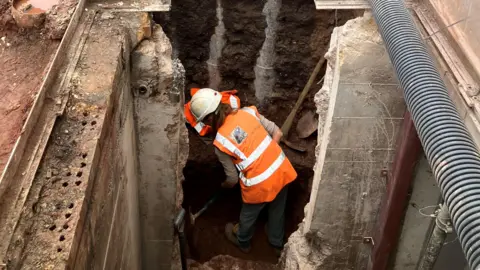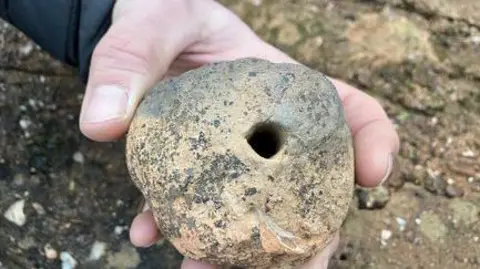Roman pottery and human remains found in Exeter
 AC Archaeology
AC ArchaeologyRoman pottery and human remains have been unearthed during the installation of an underground substation in Exeter city centre.
National Grid said the project to replace ageing infrastructure saw engineers excavate a new access point in the basement of the former Waterstones building.
It said the work required digging to a depth of about 10ft (3m) which allowed archaeologists a rare opportunity to explore some of the city's subterranean history.
Archaeologist Simon Hughes said there had been "some interesting finds" which were being analysed.
 AC Archaeology
AC ArchaeologyHe said: "We found Roman pottery representing the legacy of the former regional capital city, Isca Dumnoniorum, and an early medieval fired clay weight.
"The recovery of some dislocated human bone is hoped to represent the remains of Exeter's early medieval citizens.
"These are currently being analysed to provide a radiocarbon date.
"The results from these are eagerly awaited and are hoped to fit into the fascinating narrative of Exeter's medieval development."
Mr Hughes said the medieval layers spanned an important period in Exeter's development following the collapse of Roman Britain.
"In this location, it would have been adjacent to an evocative backdrop that included the ruins of Roman townhouses, the establishment of an Anglo-Saxon monastery in the 7th Century, and latterly a late 9th or early 10th Century minster church, now replaced by the current cathedral", he added.
'Interesting and challenging'
The engineering work is expected benefit about 300 customers, National Grid said.
Engineers diverted underground cables in Exeter's High Street, working around nearby gas and water projects.
Technician Matt Orr, who led the work, said: "This has been an interesting and challenging project which took a year to plan.
"It has not only added extra capacity to the local network, but has made it more resilient for customers with new fault-finding technology installed to trace problems quickly and restore power faster."
Follow BBC Devon on X, Facebook and Instagram. Send your story ideas to [email protected].
